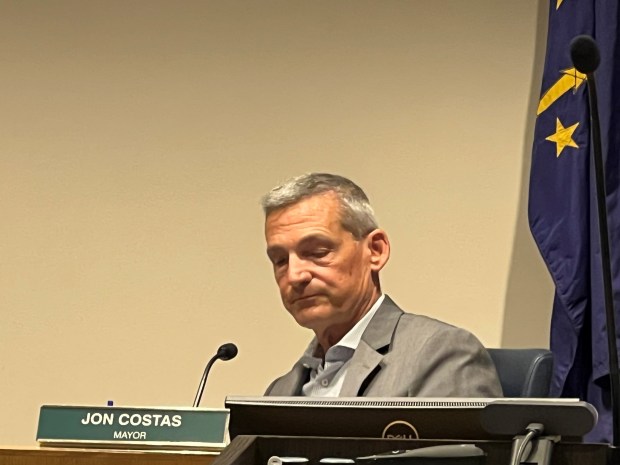Valparaiso’s responsible bidding practices continue as a topic of debate by the Valparaiso City Council and Mayor Jon Costas, with a majority of the Democratic-led council favoring a more restrictive ordinance and Costas voicing concerns that the measure could dampen development within the city.
A responsible bidding ordinance was passed at the Monday meeting by a vote of 4-2. The ordinance, said Council President Ellen Kapitan, D-At-large, sets standards and requirements for contractors submitting bids to perform construction work on public works projects, and is an extension of the city’s current ordinance.
The new ordinance establishes responsible business practices for recipients of city economic incentives on projects valued at $350,000 or more, she said. The ordinance requires contractors to meet specific conditions, including safety standards, proper worker classification, and a preference for local skilled workers.
Voting for the ordinance with Kapitan were Emilie Hunt, D-At-large; Barbara Domer, D-3rd; and Robert Cotton, D-2nd. Peter Anderson, R-5th, and Diana Reed, D-1st, opposed the measure. Jack Pupillo, R-4th, did not attend Monday’s meeting.
Pupillo presented a “softer” competing resolution at the Feb. 24 meeting, favoring greater flexibility for the interpretation of guidelines and implications of what might be factors of concern, which Reed and Anderson also supported.
Costas, who has said he opposed the ordinance, doesn’t vote on matters before the council but does have veto power, which could come into play.
The ordinance was originally crafted and introduced earlier this year by Cotton. In recent weeks, Hunt, working closely with Cotton and asking for council input, helped revise the five-page original ordinance, including more than a dozen changes with amendments and edits provided to all at Monday’s meeting.
Before a third reading and vote at Monday’s meeting, Hunt said she worked with Patrick Lyp, the city attorney, on the changes. Lyp, she added, shared the revisions and they were agreed to by various labor union partners, the mayor and the administration.
“Unfortunately, I don’t know where this stands today as far as what is acceptable to the mayor or not,” Hunt said. She went on to ask what Costas’ basis for a veto would be at this point.
“I say this because you’ve publicly said you would veto the original ordinance if it was passed,” Hunt said.
Costas told the Post-Tribune after Monday’s meeting he was still considering a veto of the ordinance “within the next 10 days.”
The ordinance, he said, could hamstring smaller companies from bidding on private projects with city incentives, could limit their growth, and hurt the potential for lower bids on a project.
“Ideas that seem beneficial in the abstract can have unintended consequences in their actual life application and this is why I feel that (the ordinance) is not in the best interests of the city of Valparaiso and local construction workers,” Costas told the Post-Tribune.
“For these reasons, I am considering vetoing the ordinance and will decide within the next 10 days.”
Costas said George Douglas, the city’s director of development, and Vicki Thrasher, the building commissioner, share concerns about the ordinance. The duties of both, he said, “will be significantly impacted” by the ordinance, “and their opinions are vital to assessing the actual impact of these proposed council actions.”
“In simplest terms, (the ordinance) extends a number of contractor requirements for public works projects, those funded entirely by the city, to private projects that receive city incentives in excess of $350,000,” Costas said.
“This is a significant expansion of our current responsible bidder ordinance as related to projects that, while they receive some degree of governmental incentive, are predominantly funded by the private sector. The nature of these projects, such as hotels, commercial buildings and apartment complexes, is different in kind from typical public works projects such as roads, bridges and public buildings.”
Costas criticized that the ordinance states, “any waivers from these requirements must be approved by a vote of the council.”
“As a practical matter, the council will likely not have sufficient information to make an informed decision on a waiver request for months, if not years, after the economic incentives are initially and conditionally approved,” Costas lamented at Monday’s meeting. “It is doubtful developers will be willing to operate with such a high level of uncertainty.”
Costas said other communities have considered the issue, but only two adopted a similar ordinance, including the town of Chesterton and the Lake County Commissioners, for economic development projects in unincorporated parts of the county.
Lake County adopted its ordinance in 2022 and Chesterton approved its ordinance in December 2024, he said, adding the effect of such an ordinance on the private sector is untested.
Based on his 20 years of experience in government leadership, he said the ordinance “will likely have the unanticipated effect of actually hurting our local workers by discouraging investment in our city, thereby reducing the number of jobs for our local workers. If so, this is a bad outcome for all concerned.”
Philip Potempa is a freelance reporter for the Post-Tribune.



